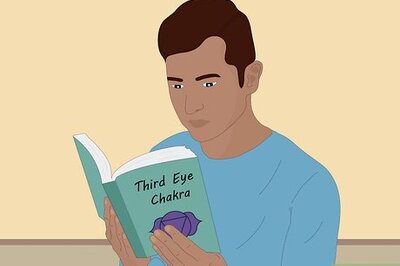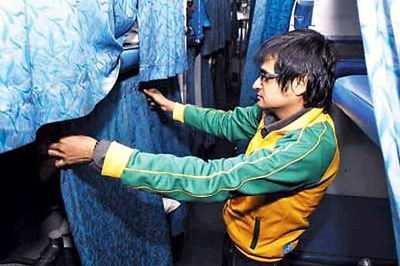
views
New Delhi: At the party office of the Congress’ Mahabal Mishra in Dabri, posters and pamphlets were being stocked up for the upcoming campaign days.
With a presence of 20-odd party workers at the office, the conversation hinged on how sitting MP Parvesh Verma of the Bharatiya Janata Party (BJ) hasn’t visited the constituency since being elected.
“Mishraji is connected with people and has worked on the ground, even though he is not an MP,” said a party worker.
The BJP MP is pitted against Balbir Jakhar of the Aam Aadmi Party (AAP) and Congress’ Mishra.
Verma, son of former Delhi chief minister Sahib Singh Verma, had defeated then Delhi speaker Yoganand Shastri from Mehrauli in the 2013 Assembly election.
In the 2009 parliamentary election, Mishra had won the West Delhi constituency with the support of Purvanchalis as well as Sikh and Punjabi voters.
However, with the entry of Arvind Kejriwal-led AAP in the 2014 election, the contest turned triangular and the BJP emerged victorious.
Verma had defeated Jarnail Singh of the AAP by a margin of 2,68,586.
But the contest could be different this time as regional identities are likely to play a key role in this constituency.
The Congress’ Mishra is a Purvanchali. Though the constituency is dominated by Sikh and Jat communities, it has a sizeable Purvanchali community. Both the BJP and AAP nominees belong to the Jat community.
A majority of the population comprises migrants from Uttar Pradesh and Bihar. The community arithmetic, however, may not play a major role in the urban segments of the constituency, though some impact could be seen in rural areas like Najafgarh and Madipur, thus helping Mishra.
“Mishraji is a leader who represents all… but yes, [him] being a Purvanchali puts us at an advantage,” another party leader told News18.com.
This observation from Congress leaders, however, hardly resonates with the public as the party’s campaign was weak.
Bhaskar Singh, a 43-year-old businessman in the Dabri area, while enjoying his cigarette at a roadside tea-stall, says he hasn’t see any sort of campaigning by any of the parties. But this wouldn’t matter for him as he has already decided who he’s going to vote for on May 12.
Singh, from Varanasi in UP, would be press the button for Prime Minister Narendra Modi. “He is a man of action and takes quick decisions. Yes, Mahabal Mishra is a Purvanchali face, but it doesn’t matter because there is wave in favour of Modi here,” Singh says.
Murari, a native of Begusarai in Bihar, has spent most parts of his life in Delhi. A graduate, Murari works in a factory in Uttam Nagar and for him, unemployment is an issue. However, he too believes that there’s no option other than Modi for the role of the prime minister. He said all the votes in the area that would go for the BJP would not be for the sitting MP, but for the Prime Minister.
This sentiment among people about voting for the BJP because of PM Modi is felt across the constituency.
As for the contesting candidates, apart from the huge socio-economic divide, they would also have to deal with the ‘community arithmetic’.
After the delimitation of parliamentary constituencies in 2008, West Delhi was constituted with 10 Assembly segments — Madipur, Rajouri Garden, Hari Nagar, Tilak Nagar, Janakpuri, Vikaspuri, Uttam Nagar, Dwarka, Matiala and Najafgarh.
While neighbourhoods such as Dwarka, Janakpuri and Rajouri Garden are considered affluent and middle-class, areas such as Hari Nagar and Matiala are home to migrants and working-class families who live in unauthorised colonies. On the other hand, Madipur and Najafgarh add rural flavour to this constituency.
But there were a few dissenting voices too. Majid Hussain, who runs a pan-shop in Sitapuri, said a lot of the factories in the locality had to shut down because of GST and demonetisation.
Sitapuri is predominantly a ghetto, comprising Muslim migrants from Uttar Pradesh, Bihar and West Bengal. Hussain believes that though the BJP may not get votes from that particular locality, it may still win the constituency.
As the conversation grows, an AAP worker, who did not wish to be named, said that although the BJP’s vote-share will go down significantly, it may still win in West Delhi. “The Modi wave is very much alive and he may return as the prime minister.”
Mohan Garden, a working-class locality of Purvanchalis in West Delhi constituency, seemed relatively busy for a summer afternoon.
Rickshaws and private ‘blue-line’ mini-buses were ferrying people from one place to another.
On a street corner, 70-year-old Syed Mohammed Ali is seen sitting on a bench and discussing politics with another man of his age. Ali, whose family migrated from Amroha in UP after Independence, has spent his whole life in Delhi working in the private sector. The higher secondary pass-out has a different take on how the elections might pan out in his constituency.
“Modi is a shrewd politician and you have to give it to him. But the kind of politics the BJP does help win despite doing no work on the ground,” Ali said.
This support for the PM remains irrespective of the issues that have severely hurt the business community here — sealing, GST and demonetisation. Shopkeepers say they are only now coming to terms with the new GST slabs.
“People might say that they support the BJP, but nothing is certain till the day of voting,” said Ashok Kumar, a shopkeeper.
With such an overwhelming support for the ruling party, ground swell for the Congress and AAP seems missing.
Unlike other areas in the neighbourhood, some Congress posters and flags were visible in Sagarpur, an area where sealing continues to remain an issue.
Both the Congress and AAP are hoping to gain from this business community’s anger. But many businessmen in the area believe that the issues of sealing may not affect the elections that much.
The battle for West Delhi might very well be a formidable one even as Balbir Singh Jakhar, AAP's fresh face will go up against two seasoned politicians.
But the Jat voters in the constituency could be a deciding factor that may help BJP’s Verma. Verma’s father was a respected Jat leader from Delhi dehat and served as a union minister in the 13th Lok Sabha. He died in 2007.
Earlier too, the constituency was considered to be very important for the Jat community, when Sajjan Kumar, a former Congress leader, was in power.
The constituency goes to polls on May 12.



















Comments
0 comment